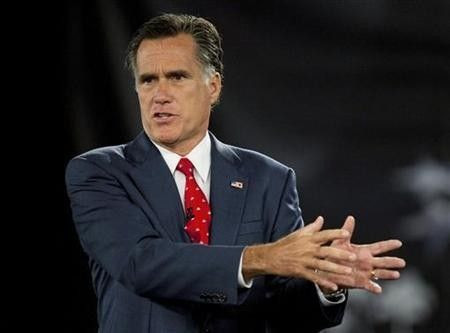Mitt Romney’s Mormon Faith: Polls Show Americans Are Suspicious of Mormonism
ANALYSIS

Even before Robert Jeffress, the pastor of the First Baptist Church of Dallas, warned those who attended last weekend's Values Voter Summit against voting for former Gov. Mitt Romney because of his affiliation with the cultish Church of Jesus Christ and Latter-day Saints, Romney's Mormon religion has ostracized him from the start of the GOP primary race.
The Republican primaries have been heavily influenced by the Tea Party -- and their largely conservative Christian supporters -- since candidates began throwing their hats into the ring earlier this year. Both former Utah Gov. Jon Huntsman, a longshot candidate who is also a Mormon, and Romney have been hindered by questions over their faith, something Romney also faced during his 2008 presidential run.
Jeffress' Comments Caused Stir
Questions regarding Romney's faith came to a head last week when Jeffress, while introducing Gov. Rick Perry, denounced Mormonism as a cult and said Romney is not a Christian as a result. While Jeffress' comments caused a stir among reporters and pundits alike, they apparently went over well with the audience at the Values Voter Summit. That is because many religious Americans are generally taught to be suspicious of Mormonism.
A September poll from the Brookings Institute, called What It Means to be American, found that Americans are generally less tolerant of Mormons than other religious groups. Sixty-seven percent of those polled reportedly expressed favorable views of the Latter-day Saints, compared with 84 percent for Jews and 83 percent for Catholics.
Moreover, a June Gallup poll found that almost a quarter of Americans -- 22 percent -- are hesitant to support a presidential nominee who happens to be a Mormon, a figure largely unchanged since 1967. In contrast, only 10 percent of respondents said they would not vote for a Hispanic and fewer than 10 percent said they would not vote for a nominee who is Jewish, Baptist, Catholic, female or black.
Evangelicals' Stance Toward Other Denominations: Not All-Inclusive
The prejudice against Mormonism seems to be a result of teachings in the Evangelical Christian Church. While the Church of Latter-day Saints considers itself to be Christian -- after all, its founder Joseph Smith was reportedly inspired to create the religion after he was visited by God the Father and Jesus the Son in 1820 -- three out of four Protestant pastors in the U.S. do not believe Mormons are Christian, according to survey released this month by LifeWay Research that polled 1,000 members of the Protestant clergy.
In a column for The Huffington Post, Randall Balmer, an Episcopal priest and professor of American Religious History at Columbia History, wrote that many fundamentalist Christians with evangelical values only reserve the world Christian for other fundamentalists -- meaning they also do not believe Roman Catholics, and even some mainline Protestants are Christians either.
Balmer wrote that one of the major things that separate Mormons from other Christian religions is their observance of the Nicene Creed, which includes the affirmation: We believe in one baptism for the forgiveness of sins. Christian groups generally regard baptism -- whether in the Catholic or Protestant Churches -- as universal, meaning an individual does not have to be baptized again if he or she wishes to change their Christian affiliation. Mormons, on the other hand, do not recognize baptisms from other Christian groups.
Mormons are also derided for their practice of polygamy, even though it was disavowed by the Church of Latter-day Saints in 1890 and only a small number of Mormons still participate in the act. Today it is only practiced by Fundamentalists who have left the church.
Most of the candidates running for the Republican nomination have not publicly commented on Jeffress' comments. Although Perry responded with curt no when he was asked whether he thought Mormonism was a cult last weekend, he did not comment on whether he agreed that Mormons are not Christian. Similarly, the staunchly Catholic former Sen. Rick Santorum, another long-shot candidate, said he sees good strong moral values, very much in line with the values of conservatives in the Mormon religion, but did not go so far as to call it Christian.
The humorous part is that many Evangelical Christians may not know enough about other religions to confidently speak out against the teachings of Mormonism. A Sept. 2010 study from the Pew Research Center found that among 3,412 Americans polled, those who identified with either the Jewish or Mormon faith were the highest scoring groups -- aside from Atheists and Agnostics -- when questioned about the core teachings of different world religions. In the 32 question survey, Mormons got an average of 20.3 of the questions right, compared with white Evangelical Protestants, who got an average of 17.6 right and white mainline Protestants, who answered 15.8 correctly.
In questions specifically regarding Christianity, Mormons on average scored higher than any other group, beating both evangelical and mainline Protestants as well as Catholics.
© Copyright IBTimes 2024. All rights reserved.





















